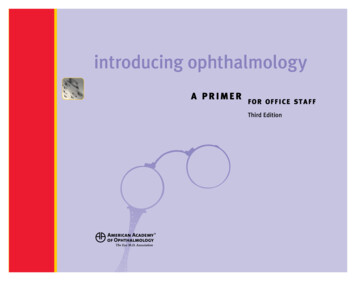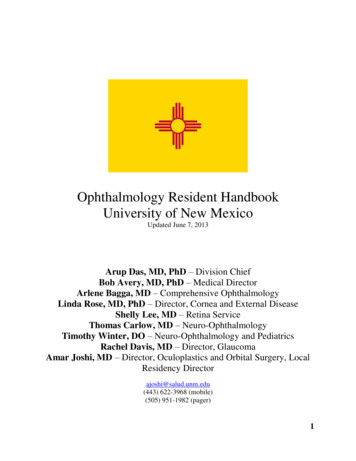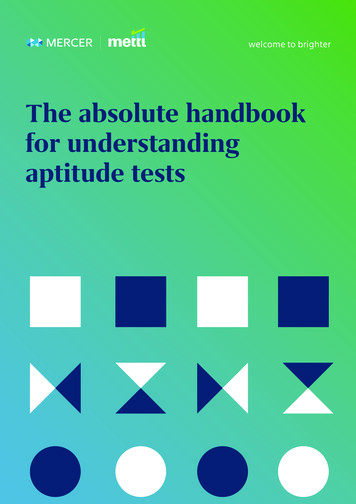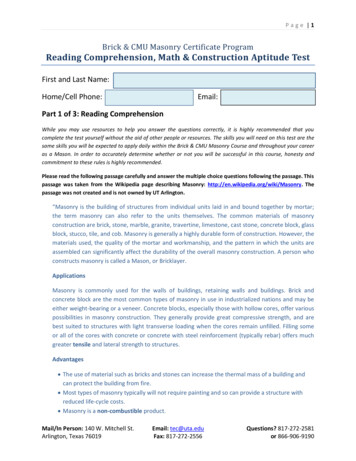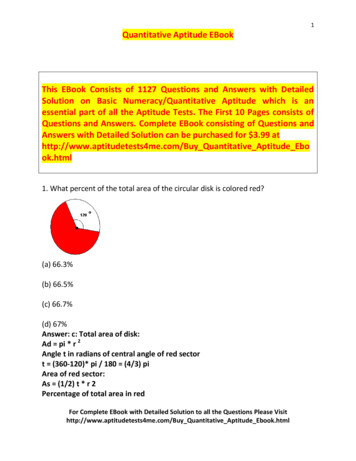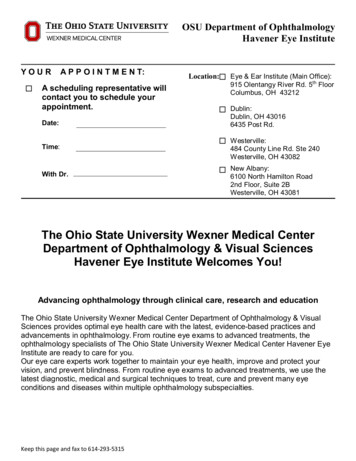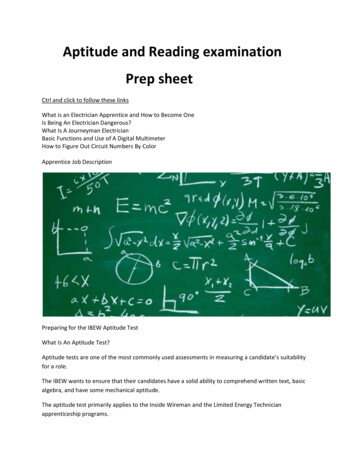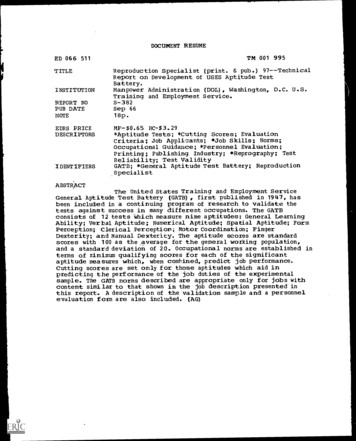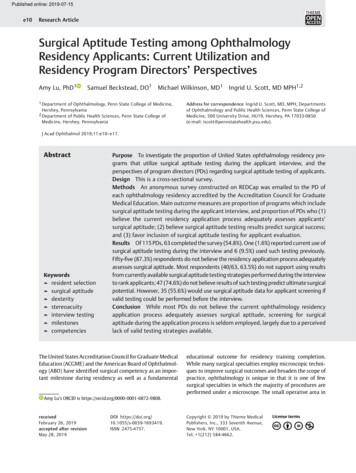
Transcription
Published online: 2019-07-15THIEMEe10Research ArticleSurgical Aptitude Testing among OphthalmologyResidency Applicants: Current Utilization andResidency Program Directors’ PerspectivesAmy Lu, PhD1Samuel Beckstead, DO1Michael Wilkinson, MD11 Department of Ophthalmology, Penn State College of Medicine,Hershey, Pennsylvania2 Department of Public Health Sciences, Penn State College ofMedicine, Hershey, PennsylvaniaIngrid U. Scott, MD MPH1,2Address for correspondence Ingrid U. Scott, MD, MPH, Departmentsof Ophthalmology and Public Health Sciences, Penn State College ofMedicine, 500 University Drive, HU19, Hershey, PA 17033-0850(e-mail: iscott@pennstatehealth.psu.edu).J Acad Ophthalmol 2019;11:e10–e17.AbstractKeywords resident selectionsurgical aptitudedexteritystereoacuityinterview testingmilestonescompetenciesPurpose To investigate the proportion of United States ophthalmology residency programs that utilize surgical aptitude testing during the applicant interview, and theperspectives of program directors (PDs) regarding surgical aptitude testing of applicants.Design This is a cross-sectional survey.Methods An anonymous survey constructed on REDCap was emailed to the PD ofeach ophthalmology residency accredited by the Accreditation Council for GraduateMedical Education. Main outcome measures are proportion of programs which includesurgical aptitude testing during the applicant interview, and proportion of PDs who (1)believe the current residency application process adequately assesses applicants’surgical aptitude; (2) believe surgical aptitude testing results predict surgical success;and (3) favor inclusion of surgical aptitude testing for applicant evaluation.Results Of 115 PDs, 63 completed the survey (54.8%). One (1.6%) reported current use ofsurgical aptitude testing during the interview and 6 (9.5%) used such testing previously.Fifty-five (87.3%) respondents do not believe the residency application process adequatelyassesses surgical aptitude. Most respondents (40/63, 63.5%) do not support using resultsfrom currently available surgical aptitude testing strategies performed during the interviewto rank applicants; 47 (74.6%) do not believe results of such testing predict ultimate surgicalpotential. However, 35 (55.6%) would use surgical aptitude data for applicant screening ifvalid testing could be performed before the interview.Conclusion While most PDs do not believe the current ophthalmology residencyapplication process adequately assesses surgical aptitude, screening for surgicalaptitude during the application process is seldom employed, largely due to a perceivedlack of valid testing strategies available.The United States Accreditation Council for Graduate MedicalEducation (ACGME) and the American Board of Ophthalmology (ABO) have identified surgical competency as an important milestone during residency as well as a fundamentaleducational outcome for residency training completion.While many surgical specialties employ microscopic techniques to improve surgical outcomes and broaden the scope ofpractice, ophthalmology is unique in that it is one of fewsurgical specialties in which the majority of procedures areperformed under a microscope. The small operative area inAmy Lu’s ORCID is uary 26, 2019accepted after revisionMay 28, 2019DOI https://doi.org/10.1055/s-0039-1693419.ISSN 2475-4757.Copyright 2019 by Thieme MedicalPublishers, Inc., 333 Seventh Avenue,New York, NY 10001, USA.Tel: 1(212) 584-4662.
Surgical Aptitude Testing among Ophthalmology Residency Applicantsand around the eye, as well as the necessity of microscopeassistance, render manual dexterity, spatial awareness, andfine motor coordination important factors in surgical outcome. Poor hand–eye coordination was the most commonlycited reason for trouble mastering surgical skills amongophthalmology residents who struggled with surgicalcompetency.1Despite the impact of these factors on surgical trainingand competency, the process of ophthalmology residencyselection at most programs lacks assessment of applicants’surgical aptitude.2 Several tests for applicants’ surgical aptitude have been investigated in other surgical fields includingorthopedics, neurosurgery, general surgery, otolaryngology,and vascular surgery.3–6 These have yielded variable results,which may be due, in part, to lack of direct correlationbetween the task tested and the specific surgical techniquesrequired for the specialty. Manual dexterity has been studiedas a predictive tool for surgical training success in ophthalmology but no significant correlation between dexteritytesting results and faculty evaluations of residents’ surgicalskills was demonstrated.7 Testing ophthalmology residencyapplicants’ stereopsis has been proposed because reducedstereopsis has been correlated with inferior simulated surgical outcomes in individuals with no microscopic surgicalexperience.8,9 To our knowledge, and based on a search of thePubMed literature database, the degree of support amongprogram directors (PDs) of ACGME-accredited ophthalmology residency programs for surgical aptitude testing as acriterion for residency applicant evaluation has not beenstudied previously.The purpose of the current study is to investigate theproportion of ophthalmology residency programs in the United States that utilize surgical aptitude testing during theapplicant interview, and the proportion of PDs who (1) believethe current residency application process adequately assessesapplicants’ surgical aptitude; (2) believe surgical aptitudeLu et al.testing results predict surgical success; and (3) favor inclusionof surgical aptitude testing for applicant evaluation.MethodsThe study was granted an exemption by the InstitutionalReview Board of the Penn State College of Medicine. An email containing a description of the study, an invitation toparticipate in the study, and a secure link to the survey wassent to the PD of each of the 115 ACGME-accredited ophthalmology residency programs in the United States, asidentified using the ACGME/ABO list serve database (www.acgme.org) in Spring 2018. The survey was constructed usingthe secure online application REDCap10 hosted at the PennState College of Medicine. Responses were collected automatically and managed under a deidentified record numbergenerated by REDCap. Reminder emails were sent to nonresponding PDs weekly for 3 weeks.The 21-item survey was composed of binary and multiple-choice questions. Demographic information includingyears in practice, years as PD, and ophthalmology subspecialty was also collected. Data were analyzed and graphedusing Microsoft Excel (Microsoft, Redmond, Washington).GraphPad Prism 5 (Graphpad Software, San Diego, California) was used to perform Wilcoxon rank sum tests forcomparisons among groups of data, with the statisticalsignificance level set at p 0.05.ResultsOf the 115 PDs, 63 completed the survey (54.8%). Therespondents’ average time in practice was 15.4 9.5 years(median, 13 years), with a mean time as PD of 7.2 6.6 years(median, 5 years). The most frequently represented subspecialties among PDs were glaucoma (14, 22.2%), cornea (12,19.0%), and comprehensive (11, 17.5%) ( Fig. 1). None of theFig. 1 Subspecialty of the responding program directors (PDs). Proportion of PDs in each subspecialty.Journal of Academic OphthalmologyVol. 11No. 2/2019e11
e12Surgical Aptitude Testing among Ophthalmology Residency Applicantsrespondents specialized in medical retina, ocular oncology,or ophthalmic pathology. The majority of respondents wereunfamiliar with current methods for surgical aptitude testing, with 2 (3.2%), 20 (31.7%), 39 (61.9%), and 2 (3.2%)characterizing their familiarity as very familiar, somewhatfamiliar, unfamiliar, or unsure, respectively.The PD of one (1.6%) program reported that surgicalaptitude testing (in this case, manual dexterity testing) iscurrently a part of the program’s residency applicant interview, and 6 (9.5%) PDs reported that some form of surgicalaptitude testing (manual dexterity in 4 cases, fine motor skillin 3, and visual spatial testing in 1) had been part of theresidency applicant interview previously ( Table 1).Reported reasons for discontinuing surgical aptitude testingwere that testing was “not indicative of an applicant’sultimate surgical potential” (3 PDs) and that “testing maydeter applicants from choosing to interview with or rankyour program highly” (3 PDs).The majority of respondents do not believe that results ofsurgical aptitude testing on interview day should be considered when ranking applicants (40, 63.5%). Similarly, mostrespondents do not believe that results of current surgicalaptitude testing strategies correlate with such measures ofapplicants’ surgical success as ultimate surgical potential(47, 74.6%), rate of surgical skills development (37, 58.7%), orteachability (40, 63.5%); 31(49.2%) respondents do not believe that current testing would correlate with any of thesemeasures.We next investigated whether the responses of the PDswere influenced by their personal training experiences andLu et al.career choices; that is, whether PDs in subspecialties thatinvolve predominantly medical management have differentperspectives on the role of surgical aptitude testing comparedwith those in subspecialties that utilize surgical or combinedmedical and surgical interventions. Responses regarding consideration of surgical aptitude testing results for applicantranking and whether such testing results correlate with ultimate surgical potential, rate of development of surgical skills,or teachability were not significantly associated with PDs’number of years in practice nor subspecialty.If valid surgical aptitude testing were available and resultsof such testing could be included in the residency application,most respondents (35, 55.6%) reported they would use thisinformation when deciding which applicants to invite forinterviews and when constructing the rank list ( Table 2).Similarly, the majority of respondents (52, 82.5%) supportedthe use of surgical aptitude testing during medical school forthe purpose of specialty selection counseling. Thus, PDs perceive a substantial difference between currently availablesurgical aptitude testing strategies and a validated surgicalaptitude testing strategy implemented prior to the interviewwith respect to utility of surgical aptitude testing results forranking applicants (current testing: mean 0.355 0.482,median 0.0; valid testing: mean 0.574 0.499, median 1.0;p ¼ 0.016 between medians; where 0 ¼ will not use, 1 ¼ willuse). Among PDs who believed that validated surgical aptitudetesting results would be useful, 19 (54.3%) believe such information could be indicative of ultimate surgical potential and19 (54.3%) would use such testing results to distinguish amonghighly qualified applicants. Among the 26 PDs (41.3%) whoTable 1 Surgical aptitude tests used and reasons for cessationYesNoType of testing, if yesCurrently testduring interview?1 (1.6%)Previously testedduring interview?6 (9.5%)62 (98.4%)Manual dexterity1 (100.0%)57 (90.5%)Type of testing, if yesVisual spatial1 (16.7%)Manual dexterity4 (75.0%)Fine motor3 (50.0%)Reason for cessationJournal of Academic OphthalmologyVol. 11No. 2/2019Not indicative of ultimate surgicalpotential3 (50.0%)Not indicative of rate of surgicalskills development2 (33.3%)Not indicative of teachability2 (33.3%)Deters applicants from interviewing at/ranking program3 (50.0%)Legal concerns1 (16.7%)Other1 (16.7%)
Surgical Aptitude Testing among Ophthalmology Residency ApplicantsLu et al.Table 2 Situation-specific reasons for and against surgical aptitude testingUse results of valid testing prior to interview forranking? (n ¼ 63)YesNo35 (55.6%)26 (41.3%)Indicative of surgical successa26 (74.3%)Not indicative of surgicalsuccess22 (84.6%)Indicative of ultimate surgical potential19 (54.3%)Not indicative of ultimatesurgical potential21 (80.8%)Indicative of rate of surgical skills development15 (44.1%)Not indicative of rate ofsurgical skills development10 (38.5%)Indicative of teachability16 (47.1%)Not indicative ofteachability12 (46.2%)Filter (attract/deter) applicants13 (38.2%)Deter applicants frominterviewing5 (19.2%)Distinguish among qualified applicants19 (54.3%)Legal concerns10 (38.5%)Other0 (0.0%)Other1 (3.8%)Unsure0 (0.0%)Unsure1 (3.8%)Is current screening adequate? (n ¼ 63)Currently perform surgical aptitude testing oninterview day8 (12.7%)1 (12.5%)55 (87.3%)No need, all applicantscan achieve surgicalcompetency duringresidency12 (21.8%)Indirect measures (i.e., letters, grades)3 (37.5%)No valid testing31 (56.4%)No need, all applicants can achieve mastery ofsurgical skills during residency training3 (37.5%)Not logistically feasible19 (34.5%)Other1 (12.5%)Should applicants be notified prior to testing?(n ¼ 63)Legal concerns21 (38.2%)Other5 (9.1%)55 (87.3%)6 (9.5%)Applicants can prepare differently30 (54.5%)Avoid surprise testing40 (72.7%)Prevent prior practice0 (0.0%)Applicants can practice18 (32.7%)Avoid increasingpre-interview stress1 (16.7%)Courtesy to the applicants43 (78.2%)Avoid deterring applicantsfrom interviewing1 (16.7%)2 (3.6%)OtherOtherUseful in retrospect with residents who haddifficulty? (n ¼ 49)Prevent applicants frompreparing differently3 (50.0%)2 (33.3%)29 (59.2%)20 (40.8%)Arrange to alter curriculum to ensure residentsuccess8 (27.6%)Would have selected theindividual regardless11 (61.1%)Counsel resident on fellowship/subspecialtyselection10 (34.5%)There are non-surgicalcareers in ophthalmology5 (27.8%)In the original ranking process9 (31.0%)Other5 (27.8%)Other0 (0.0%)would not use the testing results, the most commonly citedreason is their belief that such testing results are not indicativeof ultimate surgical potential (21, 80.8%).Despite the small proportion of programs that use or haveused surgical aptitude testing to evaluate applicants, 55 ofthe 63 respondents (87.3%) believe that the current systemfor evaluating residency applicants does not adequatelyscreen applicants’ ability to achieve surgical competency.Among these, 31 (56.4%) attribute this to lack of valid testingstrategies available, 21 (38.2%) to legal concerns, and 19(34.5%) to logistics and feasibility of testing on the interviewday. Twelve (21.8%) respondents believe that such testing isunnecessary because all applicants will be able to achievesurgical competency during residency training.Journal of Academic OphthalmologyVol. 11No. 2/2019e13
e14Surgical Aptitude Testing among Ophthalmology Residency ApplicantsMost respondents (55, 87.3%) believe that applicantsshould be notified in advance if surgical aptitude testingwill be performed during the interview day, with “courtesyto applicants” being the most commonly reported reason fordoing so (43, 78.2%) ( Table 2). The most common reasongiven among the 6 PDs who do not support notifying theapplicant in advance is so “applicants will not preparedifferently for the interview” (3, 50%).Forty-nine respondents (77.8%) reported that, over thepast 10 years, one or more residents in their program haddifficulty mastering surgical skills beyond reasonableexpectations ( Fig. 2A). Of the PDs with residents whohad difficulty, 42 (85.7%) reported that “all” (19, 38.8%) or“most” (23, 46.9%) of these residents were able to overcomethis hurdle during residency training ( Fig. 2B). The majority of PDs of these programs (29 of 49, 59.2%) believe thatsurgical aptitude testing would have been useful during theapplication screening process of the residents who struggled( Table 2). The reasons for this are relatively evenly distributed among “helpful in the original ranking process” (9,31.0%), “counsel resident on potential fellowship/subspecialty selection” (10, 34.5%), and “make arrangements to altercurriculum for that resident” (8, 27.6%). Among the 20 PDswho believe surgical aptitude testing would not have beenuseful, the most commonly reported reason is that theprogram “would have selected this individual regardless”(11, 61.1%), followed by “there are great career optionswithin ophthalmology that do not require excellent surgicalskills” (5, 27.8%). The remaining comments focused on otherfactors that contribute to surgical skills development and thelack of valid surgical aptitude testing strategies available.DiscussionSurgical competency milestones comprise 2 of the 8 milestones established by the ACGME for graduation from ophthalmology residency. One survey reported that 56 of 58responding ophthalmology residency programs had 1 orLu et al.more residents who struggled with surgical skills mastery,9% of all ophthalmology residents had this difficulty, and 12%of residents who struggled with surgical skills were asked toleave residency.1 The majority of residents who voluntarilyleave ophthalmology programs transfer to a nonproceduralspecialty, although this may not be related to their surgicalskills.11 The current study confirms that a high proportion(77.8%, Fig. 2A) of programs have had residents withdifficulty mastering surgical skills beyond reasonableexpectations of surgical training. While the majority of PDsreport that “all” or “most” of these residents were able toovercome this difficulty, a subset of residents were not ableto do so ( Fig. 2B).A potential strategy for decreasing the proportion ofresidents who leave ophthalmology programs due to aninability to master surgical skills is screening for surgicalaptitude during the ophthalmology residency applicationprocess. Algorithms for surgical aptitude testing have beenimplemented for individuals seeking to enter advancedsurgical training after core surgical training in the UnitedKingdom12,13 and have been studied in the United States insurgical fields other than ophthalmology with varyingresults.3–6 Vision screening has been proposed as a screeningtool among applicants8 and specific testing strategies formanual dexterity and simulator use have been studied inophthalmology residents.7,14,15 However, ophthalmologyresidency PDs’ perspectives regarding surgical aptitude testing as part of the residency application process has not beenstudied previously.The current study is the first national survey of ophthalmology residency PDs to investigate the proportion of programs that currently use surgical aptitude testing in theirophthalmology residency selection process and to study theperspectives of ophthalmology residency PDs with regard toinclusion of surgical aptitude testing for applicant evaluation. Results of this survey demonstrate that surgical aptitude testing is rarely used during the residency selectionprocess. Programs that employed such testing previouslyFig. 2 Programs with residents who had difficulty mastering surgical skills beyond reasonable expectations. (A) Proportion of program director(PD) responders by number of residents, during the past 10 years, who had difficulty mastering surgical skills beyond reasonable expectations.(B) Proportion of PD responders by proportion of residents who, during the past 10 years, overcame difficulty in mastering surgical skills.Journal of Academic OphthalmologyVol. 11No. 2/2019
Surgical Aptitude Testing among Ophthalmology Residency Applicantsstopped doing so, largely due to (1) a perceived lack ofcorrelation between surgical aptitude testing results andsurgical skills development and (2) the possible negativeimpact of such testing on applicants’ ranking of programs.Only one-third of respondents believed that results fromcurrently available surgical aptitude testing strategies shouldbe considered when ranking applicants. Less than half of therespondents felt that results of such tests are predictive ofultimate surgical potential, rate of progression of surgicalskills, or ease of teaching surgical skills to the applicant.Despite this limited support for use of currently availablesurgical aptitude testing strategies, the majority of respondents (87.3%) do not believe that the current process ofresidency applicant screening and evaluation adequatelyassesses the ability of applicants to achieve surgical competency. The low utilization of surgical aptitude testing is largelydue to a perceived lack of valid surgical aptitude testingstrategies currently available. The majority of respondentsreported they would use the results of valid surgical aptitudetesting performed prior to the interview day (i.e., included inthe application package) when deciding which applicants toinvite for interviews and when constructing the rank list( Table 2). There was also support for validated surgicalaptitude testing conducted by medical schools for the purposeof specialty selection counseling of medical students. Thiscould potentially improve students’ abilities to make informeddecisions regarding choice of specialty and reduce the numberof residents who have difficulty with attaining surgical competency. However, even validated testing strategies can yieldfalse positives and negatives, and these results could undulyinfluence a student’s decision to apply or not apply to a surgicalspecialty. Another consideration is that most trainees improvewith practice ( Fig. 2B) and, therefore, surgical aptitudetesting results may not be reflective. The degree to whichsurgical competency is teachable or attainable may vary basedon the training curriculum and the learner’s maturity anddedication.Findings from this study indicate that PDs have substantial interest in understanding the baseline surgical aptitudeof their applicants but are concerned about the validity andfeasibility of testing. Validity testing has been performed insurgical fields outside ophthalmology with varying resultsand multifactorial considerations in study design.16,17 Inotolaryngology, the quality of applicants’ soap carvingsduring residency interviews did not correlate with programs’final assessments of applicants’ surgical skill.6 In generalsurgery, there was no self-selection of surgical versus medical training by medical students based on actual surgical skillor experience with manual dexterity activities.18 However,several studies have demonstrated correlations betweenaptitude and speed of learning during simulation of specificprocedures including laparoscopic appendectomy, endovascular skills, and z-plasty in medical students and residents.5,19,20 Of note, studies of visual spatial testingrevealed that residents with higher aptitude skills performedbetter on simulations but not ACGME milestones.21 Anotherconsideration is that aptitude tests may have a role inpredicting progression of a specific microsurgical skill setLu et al.but may not be reflective of all the aspects, includingnonsurgical, necessary to becoming a successful surgeon.The aforementioned studies highlight the importance ofvalidating aptitude tests against objective measures of surgical success that are relevant to the training process of aspecific specialty and to clinical practice. In the ophthalmology literature, dexterity testing alone was unable to distinguish ophthalmology resident success as assessed by facultyevaluations; testing of multiple factors, including spatialperception and practical surgical skills, was suggested.7Other works have shown that fine motor skills and stereoacuity affect performance on cataract surgery simulators.9,22,23 Furthermore, results on virtual reality cataractsimulators have been reported to be significantly associatedwith real-life cataract surgery performance.15,24–26 It isimportant to note that, in these studies, there were improvements in all participant groups except experienced surgeons.9,24 This indicates that attitude toward andwillingness to practice, in conjunction with inherent ability,are critical components to fully predict surgical skills development. Furthermore, because manual dexterity tests didreflect higher surgical aptitude in residents compared withthe general population7 and skills gained from one simulatordid not transfer to another,23 it is important to utilize a test orseries of tests that are valid. In addition, it is important toconsider the improved performance of participants afterpractice, suggesting that applicants’ surgical aptitude testingresults may be influenced by whether or not they have priornotification of the specific nature of the testing, which mayvary based on each applicant’s familiarity with the programand the timing of the interview offer.In addition to a perceived lack of available valid surgicalaptitude tests, other barriers to utilization of surgical aptitude testing during the ophthalmology residency selectionprocess include PDs’ concerns regarding potential legalramifications (38.2%), logistics of including such testing onthe interview day (34.5%), and perception that most applicants would be able to master surgical skills competenciesduring residency training such that baseline surgical aptitude testing is not necessary (21.8%) ( Table 2). There wasalso concern that prior notification of testing would increaseapplicants’ stress regarding the interview (16.7%) and negatively impact applicants’ opinion of the program (16.7%).Research in general surgery and otolaryngology has shownthat one to two forms of aptitude testing was acceptable toapplicants and was logistically feasible during interviewday.27In terms of potential legal ramifications, applicants areprotected against discrimination during the medical residency interview process on the basis of race, gender, religion,and disabilities, among others, by several federal statutes.These include Title VII of the Civil Rights Act and theAmericans with Disabilities Act (ADA).28,29 The ADA grantsprotection to persons with an impairment that substantiallylimits one or more major life activities, one of which is“working.” Specifically, the 2008 amendment of the ADAled to repudiation of judicial narrowing of the terms “substantially” and “major,” which may qualify more medicalJournal of Academic OphthalmologyVol. 11No. 2/2019e15
e16Surgical Aptitude Testing among Ophthalmology Residency Applicantstrainees seeking employment that involves specific expertise.30 Poor performance on surgical aptitude tests may bedue to a disability. Ranking an otherwise qualified applicantlow due to poor performance on surgical aptitude tests mightbe considered discriminatory and individuals who havedifficulty mastering surgical skills should, ideally, be provided with the extra training needed to master those skills. Mostof the PD respondents in our study who had residents withdifficulty mastering surgical skills beyond reasonableexpectations reported that these residents were ultimatelyable to master those skills. The Equal Employment Opportunity Commission has stated that pre-employment inquirieswhich express gender discrimination is unlawful unless“based upon a bona fide occupational qualification.”31 Thisurges consideration of whether or not surgical aptitudetesting is based upon a bona fide occupational qualification.Study limitations include the fact that the perspectives ofthe 63 PDs who responded to our survey may not berepresentative of the perspectives of all PDs. There mayalso be some bias in that PDs who feel more strongly for oragainst surgical aptitude testing might have been moremotivated to participate. Moreover, there may be some recallbias, as the PDs were asked to recall details of their program,which may be simpler for some respondents than othersbased on such factors such as program size and duration ofthe respondent’s tenure at his or her program.Overall, factors other than those measured by surgicalaptitude testing are important to surgical and clinical successin ophthalmology, and most individuals who do not performwell on cataract simulator exercises are able to improve withpractice. However, with the large number of qualified applicants and the ACGME requirements for surgical competency,surgical aptitude testing may be a useful tool to distinguishamong applicants and/or to modify the surgical curricula asneeded for those otherwise outstanding residents who mayhave difficulty with mastery of surgical skills.NoteThis study was presented in part at the Association forResearch in Vision and Ophthalmology Annual Meeting,2019, Vancouver British Columbia, Canada.FundingNone.4 Roitberg B, Banerjee P, Luciano C, et al. Sensory and motor skill567891011121314151617181920Conflict of InterestNone declared.2122References1 Binenbaum G, Volpe NJ. Ophthalmology resident surgical compe-tency: a national survey. Ophthalmology 2006;113(07):1237–1244232 Lee AG, Golnik KC, Oetting TA, et al. Re-engineering the residentapplicant selection process in ophthalmology: a literature reviewand recommendations for improvement. Surv Ophthalmol 2008;53(02):164–1763 Williams JF, Watson SL, Baker DK, et al. Psychomotor testing fororthopedic residency applicants: a pilot study. J Surg Educ 2017;74(05):820–827Journal of Academic OphthalmologyVol. 11No. 2/2019Lu et al.2425testing in neurosurgery applicants: a pilot study using a virtualreality haptic neurosurgical simulator. Neurosurgery 2013;73(Suppl 1):116–121Van Herzeele I, O’Donoghue KGL, Aggarwal R, Vermassen F, DarziA, Cheshire NJW. Visuospatial and psychomotor aptitude predictsendovascular performance of inexperienced individuals on avirtual reality simulator. J Vasc Surg 2010;51(04):1035–1042Tang CG, Hilsinger RL Jr, Cruz RM, Schloegel LJ, Byl FM Jr, RasgonBM. Manual dexterity aptitude testing: a soap carving study.JAMA Otolaryngol Head Neck Surg 2014;140(03):243–249Kirby TJ. Dexterity testing and residents’ surgical performance.Trans Am Ophthalmol Soc 1979;77:294–307Blomquist P. Is it time to adopt vision screening for ophthalmology residency program applicants? J Acad Ophthalmol. 2014;07(01):e001–e002Sachdeva R, Traboulsi EI. Performance of patients with deficientstereoacuity on the EYESi microsurgical simulator. Am J Ophthalmol 2011;151(03):427–33.e1Harris PA, Taylor R, Thielke R, Payne J, Gonzalez N, Conde JG. Researchelectronic data capture (REDCap)—
surgical aptitude testing strategies and a validated surgical aptitude testing strategy implemented prior to the interview with respect to utility of surgical aptitude testing results for ranking applicants (current testing: mean 0.355 0.482, median 0.0; valid testing: mean 0.574 0.499, median 1.0;
